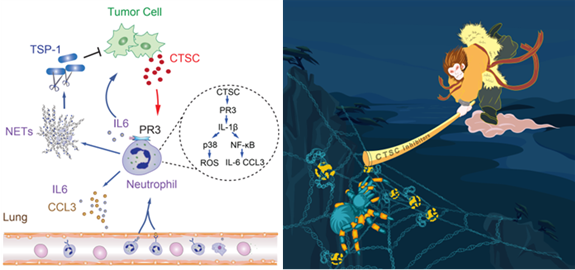- Home >> ALL News >> Highlights
Study Sheds Light on Neutrophil Regulation in Breast Cancer Lung Metastasis
Lung metastasis is the major cause of breast cancer-related mortality. Previous findings have highlighted that neutrophil-associated inflammatory microenvironment aids tumor cells for metastatic colonization in lungs. However, how neutrophils are recruited to the metastatic niches and activated by tumor cells to switch from tumor suppression to tumor promotion remains incompletely understood.
More importantly, neutrophils can play their roles in infection and inflammation by forming a very unique web-like structure called neutrophil extracellular traps (NETs), composed by decondensed chromatin and associated granule proteins, to trap and kill pathogens. It is yet to know how tumor-induced NETs regulate metastatic growth in metastatic niches.
A recent study led by Dr. HU Guohong from Shanghai Institute of Nutrition and Health (SINH) of the Chinese Academy of Sciences demonstrates that the tumor-derived protease cathepsin C (CTSC) promotes lung metastasis of breast cancer, by regulating neutrophil infiltration and NET formation in early metastatic niches. This study showed that CTSC secretion is associated with breast cancer metastasis to lungs, both in breast cancer cell lines and clinical samples. This finding is the continuity of the study by Dr. HU’s group that published in Nature Cell Biology in 2017 and reported the role of neutrophils in breast cancer lung metastasis.
The functional significance of CTSC promoting lung metastasis of breast cancer was validated using various metastasis models in animals. Mechanistically, CTSC enzymatically activates neutrophil membrane-bound proteinase 3 (PR3) to activate NF-κB signaling, leading to upregulation of cytokines including IL6 and CCL3 for neutrophil recruitment. PR3 activation also induces neutrophil ROS production and NETosis, the process of neutrophil programmed death and NET formation. NETs degrade the metastasis-suppressive ECM protein thrombospondin-1 and thus support metastatic growth of cancer cells in lungs.
Importantly, targeting CTSC with compound AZD7986 effectively suppresses lung metastasis of breast cancer in a mouse model. Overall, the findings reveal a mechanism how tumor cells regulate neutrophils in metastatic niches and support CTSC-targeting approaches for cancer treatment.
Entitled “Cathepsin C Promotes Breast Cancer Lung Metastasis by Modulating Neutrophil Infiltration and Neutrophil Extracellular Trap Formation”, this research was published online in Cancer Cell on January 14, 2021. It was sponsored by the National Natural Science Foundation of China, the Chinese Academy of Sciences and the Science and Technology Commission of Shanghai Municipality.
Dr. HU Guohong is the corresponding author of the article. Dr. XIAO Yansen is the first author of the work. The work was also supported by Dr. YANG Qifeng at Qilu Hospital of Shandong University, YANG Qingcheng at Shanghai Jiao Tong University Affiliated Sixth People’s Hospital, Dr. GAO Qiang at Zhongshan Hospital, Dr. WANG Hongxia at Shanghai General Hospital, and Dr. QIAN Youcun and Dr. XIAO Yichuan at SINH.

The schematic and cartoon model of the role of CTSC to regulate neutrophils in metastatic niches.
(Image provided by Dr. HU's group)
Media Contact:
WANG Jin (Ms.)
Shanghai Institute of Nutrition and Health,
Chinese Academy of Sciences
Email: sibssc@sibs.ac.cn
Web: http://english.sinh.cas.cn/


